
[ad_1]
Well, I think this is probably the first and only time I’ve ever heard British documentarian Adam Curtis appear as an ominous backing sample in an RPG boss battle theme, but in many ways, I hope it’s not the last. Forget the operatic choral chants of Final Fantasy bosses. The new rallying cry against peak villainy is now some no-nonsense British commentary about the state of human extinction. It works surprisingly, well, and Small Saga is a game shot through with these kinds of Britishisms, set in the parks, streets and underbelly of modern-day London.
Only this isn’t an RPG about humans, but the rodents that live beneath their feet – the mice, rats, squirrels and moles who have developed a kind of proto-medieval society of their own built from the trash and discarded objects they’ve scavenged from under our noses. In this world, humans are terrifying ‘gods’, supermarkets with their shelves of seeds and grain are called ‘Heaven’, and your main mode of transportation is a pigeon with a wicker basket. It’s a fascinating world solo developer Darya Noghani has created here, and it would be a thrilling turn-based RPG, too – if only its battles didn’t completely cheese it when it comes to providing any sense of challenge.
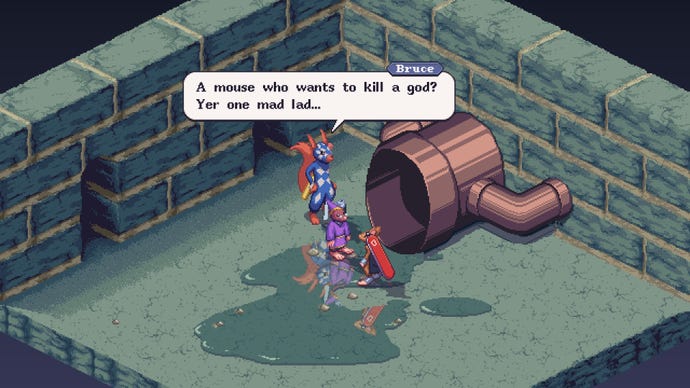
It’s a real shame Small Saga’s combat is such a cakewalk, as it has all the makings of a robust turn-based battle system. At the heart of this revenge tale against their god-like oppressors is Verm, a young mouse whose brother Lance gets minced early on by a hazmat-wearing pest controller. Driven by a deep-seated rage, Verm eventually acquires his very own god-weapon – a switchblade that makes him a veritable Cloud Strife among his peers. He acts like a Final Fantasy protagonist, too, mixing in some of Squall Leonhart’s standoffishness and penchant for cold-hearted “Whatever”s at every available opportunity, and his battle technique is all geared around going berserk to slice up his opponents in a short and sharp fashion.
Joining him on his journey is a diverse cast of accompanying rodents: there’s an Irish mole noble whose cigarette lighter casts her as the mage of the group; a queer Scottish red squirrel who, yes, does get called a “spoony bard” at one point, and whose abilities all centre on buffing and healing your allies; and finally there’s a queer, possibly Welsh albino lab rat whose red cloak and javelin-like scalpel blade make her the spitting image of Freya from Final Fantasy IX. They’re a very capable bunch when they’re altogether, though they’re also often pulled apart by the story to help bring a heightened sense of drama to some of its one-on-one combat scenarios.
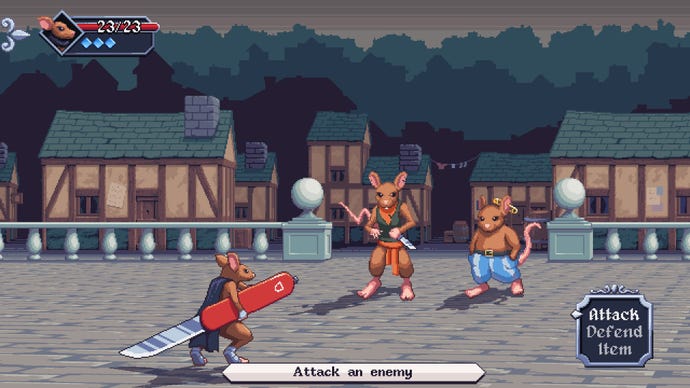
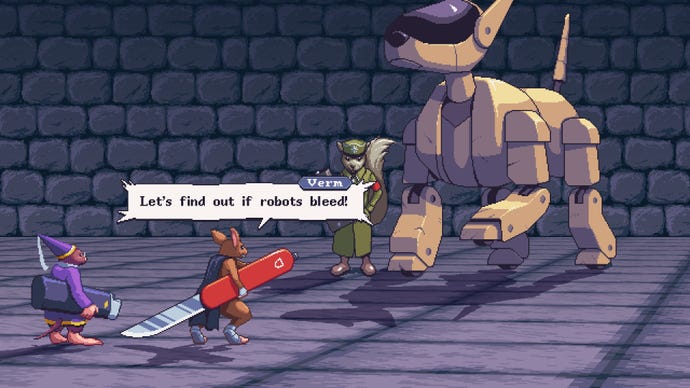
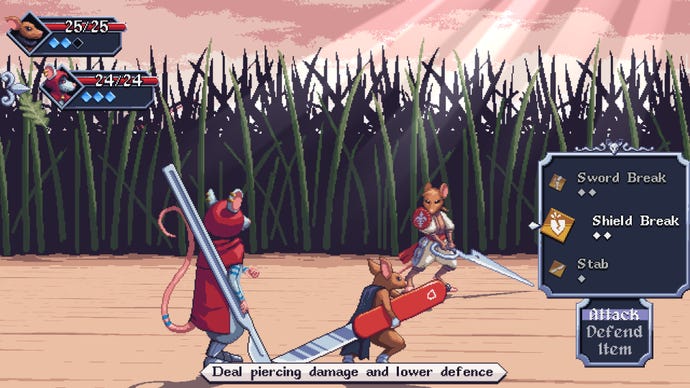
You see, battles are fixed and predetermined in Small Saga, occurring only at set points during the story. It’s a refreshing approach that completely eliminates having to grind or worry about keeping pace with its enemies, and it also helps to keep its runtime to a very brisk six or so hours (and that’s including its small smattering of side-quests, too). It’s very fast-moving, which is a blessing in this day and age, and there’s a compelling rhythm to each encounter. Every attack has its own set of ability points attached to it, for example, and you’ll need to balance the cost of these attacks against defending to help replenish your stock of points on your next turn. It’s a familiar, if simplified version of other systems we’ve seen elsewhere in Japanese RPGs, and early on it’s compelling enough to keep you hooked as you begin to unravel its engrossing story.
The problem, though, is that it’s all just far too easy at time of writing, which completely robs it of any stakes or tension. Even its bosses pose about as much threat as the toads and cockroaches you face very early on, as many of their attacks don’t even break into double digits. Granted, this is an RPG that likes to keep its numbers, well, small, but when regular enemies only ever deal damage in the region of 1-3 HP, and you have a health bar of 30+ that automatically replenishes after every battle, it all starts to feel a bit toothless. It also doesn’t make much use of its animal-based weapon weaknesses, either – a system that gets introduced within the first hour as you tackle a large, foreboding house cat, and is then seemingly forgotten about immediately after. This would have helped apply just a tiny bit more pressure to its ensuing battles, but really, it’s the numbers that need tweaking here more than anything else.
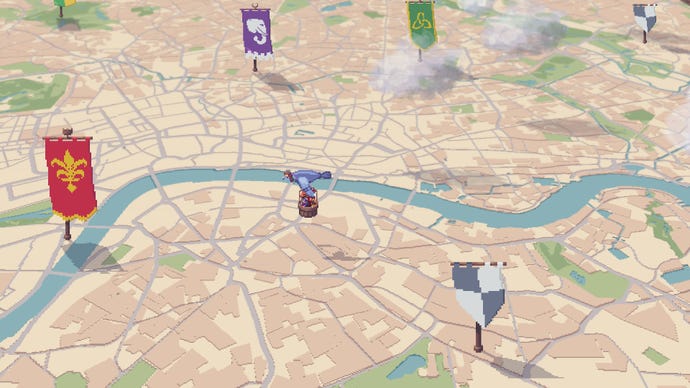
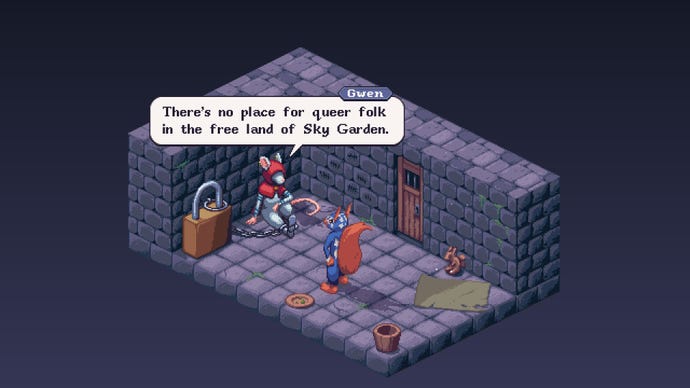
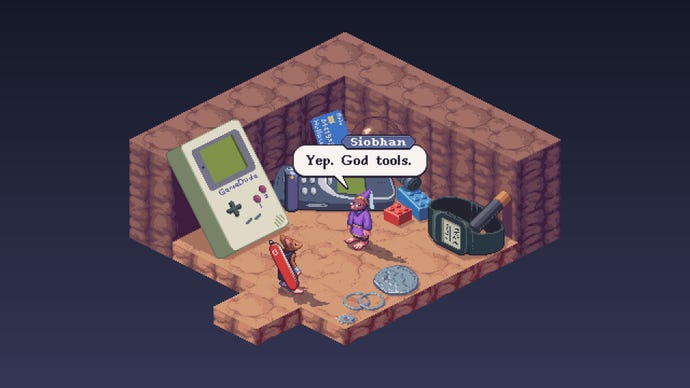
If enemies put up more of a fight, Small Saga would shine so much brighter – even if its battle system is, by comparison, relatively straightforward. Its story is a gripping one, and it has much to say about the treatment of minorities, alongside disabled and gay and queer culture. It’s also just stuffed with lots of incidental details that help bring its world to life, from its despotic, vape-puffing grey squirrels and Roman, “Ave!” shouting voles to its grinning bats that do a very good Resi 4 merchant “What are ya buyin’?” impression. It has such a strong sense of place that you can’t help but get swept up in it all, so it’s a shame Small Saga’s combat doesn’t quite match up in this regard.
Hopefully, with a bit of rebalancing, Small Saga might yet reach the upper echelons of pint-sized RPGs, joining the likes of Jack Move as another lively reimagining of their Final Fantasy inspirations in miniature. As things currently stand, though, Small Saga gets a much more tepid recommendation – though I’d be half-tempted to say the Adam Curtis battle music (and its excellent score more generally) is almost worth the very reasonable price of entry alone. It’s certainly a one-off, I’ll give it that, so if you can stomach its lack of challenge, you’ll probably still have quite a good time with it.
This review was based on a retail build of the game provided by the developer Darya Noghani.
[ad_2]